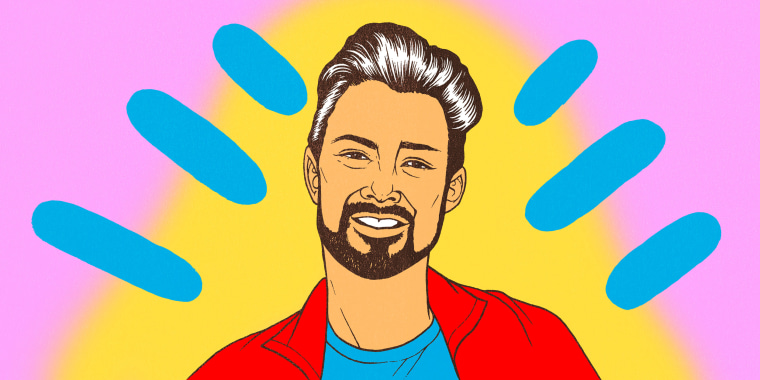Jayson Conner used to be homeless. Now, he's a co-founder of Backpacks for the Street, a volunteer organization that delivers backpacks filled with COVID-19 supplies to those experiencing homelessness.
"I'm like an empath," Conner, 42, told NBC News. "When I'm walking around the city, I can feel people's energies."
"The euphoria feeling that I get when I see people — the reaction of helping them — it's really cool, and I just think it's amazing when I can cheer somebody up."
Jayson Conner
That sixth sense, he said, fuels him to help the homeless. "I can feel their pain. I can feel it when they're scared," he said.
The bags, which Backpacks for the Street volunteers deliver to the homeless in a rented U-Haul van, are packed with gloves, masks, hand sanitizer and basic necessities like toothpaste, socks, menstrual hygiene products and food.
Conner founded the nonprofit with his fiancé, Jeffrey Newman, in 2018. The pair launched their nonprofit after volunteering at a soup kitchen in Brooklyn and saw how desperate homeless people were for help.
"Helping people gets me high," Conner said. "The euphoria feeling that I get when I see people — the reaction of helping them — it's really cool, and I just think it's amazing when I can cheer somebody up."
Before he met Newman in 2004, Conner was homeless for two years. Born and raised in the San Francisco Bay Area, he spiraled into drug addiction in the early 2000s after a friend offered him ecstasy. Conner, a survivor of childhood sexual, physical and emotional abuse, said he took the pill without much thought.
"Almost immediately, I became completely addicted, and it led me down a very, very dark path," Conner said. He said ecstasy soon became a gateway to crystal meth.
As he sank further into addiction, Conner lost contact with friends and family and soon found himself sleeping on the streets. He said he began engaging in sex work in exchange for a warm couch to sleep on. A drug dealer whom he considered a friend took him to New York City, where he hoped to start a new life. But the so-called friend, he said, was only using him to sell drugs. Conner soon found himself back on the streets, again engaging in survival sex work, and soon discovered he had HIV.
Drug addiction, he said, destroyed him emotionally.
"There's, like, a switch in your brain. It just shuts it off," Conner said. "It just turns you into a different person where you don't feel anymore."
Out on the Frontline: Jayson Conner is one of NBC Out's 2020 Pride Month honorees. To see the full list, click here.
Conner eventually met Newman, then a businessman, through mutual acquaintances and moved in with him. Although Conner was no longer homeless, he continued his struggle with alcohol and drugs until 2015, when he admitted himself to a rehab center.
"I just got tired of the pain of waking up every day," said Conner, who said he has been sober for five years.
Conner, who was working as a waiter at a busy Manhattan restaurant before the pandemic forced nonessential businesses to close, said working hard and helping others have been keys to staying sober. Since he lost his job, he said, he's been dedicating about 50 to 60 hours a week to Backpacks for the Street.
"I work all day long," said Conner, who spends hours stuffing backpacks with supplies in a rented warehouse when he's not scouting the streets for the homeless.
At least 75 homeless people have died of COVID-19, according to the New York City Department of Social Services.
Not only are homeless people more exposed to the virus, Conner said, but they are also dealing with discrimination from people who assume they have COVID-19.
"They don't even want to go next to them with a 10-foot pole, because they're terrified that they're going to catch something from homeless people," he said.
Conner said that many homeless people are scared amid the public health crisis but that when he hands them a backpack, their faces light up.
"That gets me high," Conner said. "That's just amazing to me."



